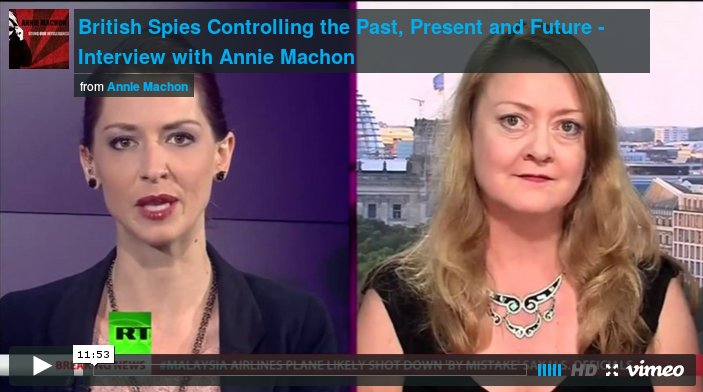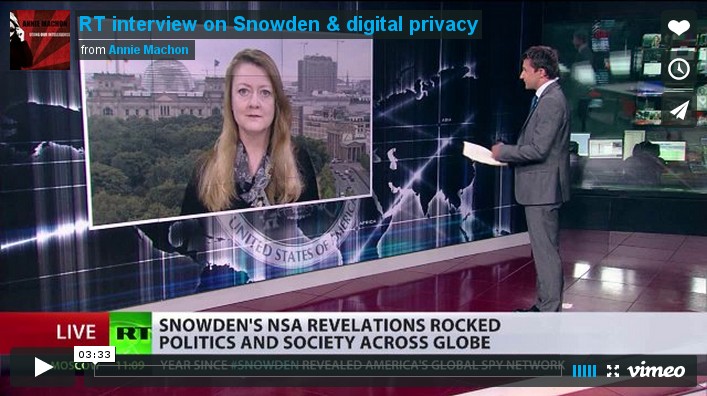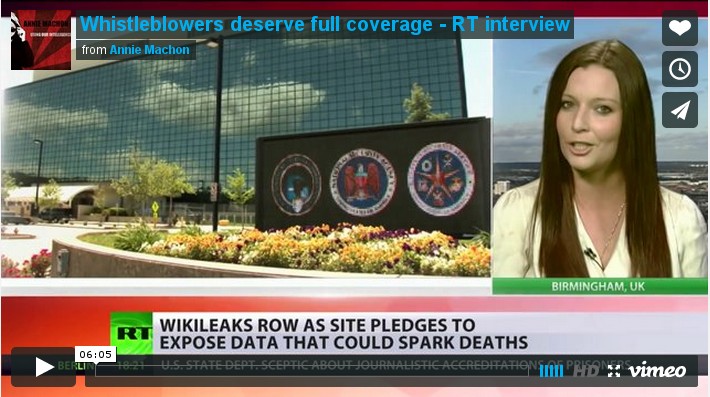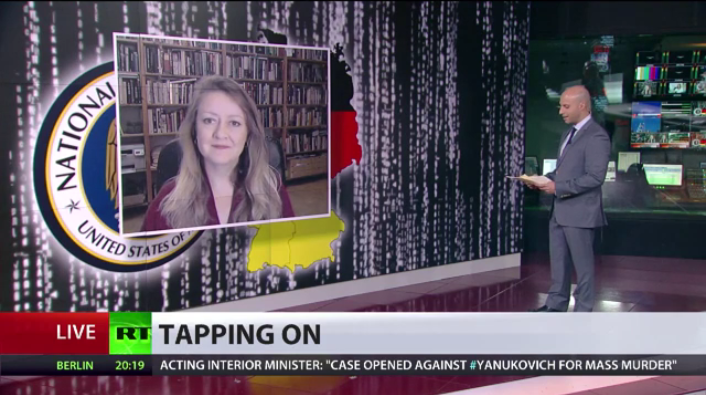Here’s my interview from yesterday on RT’s excellent Breaking the Set show with host, Abby Martin. We discussed all things spy, surveillance, Snowden, oversight, and privacy. A fun and lively interview! Thanks, Abby.

Here’s my interview from yesterday on RT’s excellent Breaking the Set show with host, Abby Martin. We discussed all things spy, surveillance, Snowden, oversight, and privacy. A fun and lively interview! Thanks, Abby.

Here is an interview I did on 5th June, the anniversary of the start of Edward Snowden’s disclosures about the global surveillance infrastructure that is being built.

RT interview on Snowden & digital privacy from Annie Machon on Vimeo.
First published on RT OP-Edge. Also on Consortium News, Huffington Post, and the Sam Adams Award website.
A year ago I stumbled across a story about a worrying new surveillance programme developed by the NSA: Prism. While nobody was identified as the source of the disclosure, I was awestruck by the bravery of this unknown person.
At that time the Obama administration had been waging an aggressive war on whistleblowers: ex-CIA officer, John Kiriakou, who exposed the CIA’s torture programme, was languishing in prison while the torturers went free; Kirk Wiebe, William Binney and Thomas Drake of the NSA had narrowly escaped prosecution for exposing NSA malfeasance — indeed, despite having gone through all the approved channels, Drake had faced a 35-year prison sentence; and of course the kangaroo court had just started to try Chelsea Manning for her exposure of US war crimes. Inevitably, it is the whistleblower Manning who is now serving a 35 year stretch in prison, not the war criminals.
President Obama has used and abused the 1917 US Espionage Act against whistleblowers during his years in the White House more times than all his predecessors put together, while at the same time allowing a bone fide spy ring — the Russian illegals exposed in 2010 — to return home. This paranoid hunt for the “insider threat” has been going on since at least 2008, as we know from documents leaked to Wikileaks in 2010.
Against this background, fully aware of the hideous risks he was taking and the prospect of the rest of his life behind bars, a young man stepped forward. Four days after the initial Prism disclosure, Edward Snowden announced to the world that he was the source of the story and many more to come. He was clear then about his motivation and he remains clear now in the few interviews he has done since: what he had seen on the inside of the NSA caused him huge concern. The American intelligence infrastructure, along with its equivalent agencies across the world, was constructing a global surveillance network that not only threatened the constitution of the United States, but also eroded the privacy of all the world’s citizens.
The global surveillance state wanted to “master the internet”, as another disclosure proved, and the UK’s GCHQ stepped up to the plate. As increasing numbers of us conduct aspects of our lives over the internet (be it banking, health, social lives, organisations, activism, relationships) this growing lack of privacy strikes at the very root of democracy. Privacy was enshrined as a basic human right in the UN Declaration in 1948 precisely because without it we are vulnerable to the encroachments and abuses of the state. What Snowden has disclosed would the the Stasi’s wet dream and goes far beyond the dystopic horrors of George Orwell’s novel “1984”.
So what did Snowden disclose? Prism was only the start, and that was bad enough — a programme to scoop up all our metadata: whom we’re in contact with, for how long, what we’re reading, what we’re viewing. NSA apologists say that this is not invasive, it is not looking at the contents of communications. I can assure your that metadata is intelligence gold dust. It can provide a far more detailed overview of a person’s life than any individual communication often can.
But it gets worse. Then came Tempora and associated documents that disclosed that the UK’s GCHQ was mainlining information from the transatlantic fibre optic cables, which affected all European citizens, as well as displaying how GCHQ was prostituting itself to the NSA for money and putting NSA objectives above the priorities of the UK government.
And then XKeyscore, enthusiastically used by Germany’s BND, presumably without the knowledge of its political masters. There have been many more: Brazil’s Petrobras oil company, the French telephone network, charities, the Muscular access point and the massive Fascia database, which contains trillions of device-location records.…. Where to stop?
This year Britain’s Joint Threat Research Intelligence Group was using Squeaky Dolphin’s real-time monitoring of social media networks, and the bulk collection of private webcam images via the Optic Nerve programme.
This last most grimly does away with the “done nothing wrong, nothing to hide” argument. In this era of families living in different countries and long distance relationships, video skype is increasingly used to stay in contact with loved ones. And this contact can be somewhat intimate at times between couples. On video. Anyone who has ever used skype for such purposes must surely be feeling violated?
Out of this morass of spying came moments of personal annoyance for western politicians, not least the information that German Chancellor Angela Merkel’s mobile phone was also being tapped, as were those of numerous other politicians. Which rather blows out of the water the much-abused argument that all this surveillance is to stop terrorists. On what planet would the NSA spooks need to live to seriously think that Merkel could be deemed a terrorist?
All these disclosures are of the gravest public interest. Yet how have western politicians reacted? In the usual way — shoot the messenger. All the standard li(n)es have been trotted out by the spies: Snowden was too junior to know what he is talking about, and was “just” a contracted systems administrator (this line says more the ignorance of the politicians about all things tech than anything about Snowden’s job); that Snowden is a traitor for fleeing to Russia, when in fact he was trapped there by the USA withdrawing his passport while in transit to Latin America; or that he should “man up” and return to the US to stand trial. There were even apparently calls from the spies for him to be extrajudicially murdered.
Despite this, his disclosures have resulted in congressional hearings in the US, where senior spooks have been caught out lying about the efficacy of these spy programmes. A US federal judge has declared the NSA’s activities unconstitutional, and minor reforms are underway to protect the rights of US citizens within their own country.
Which is a start. However, that still leaves the rest of us living under the baleful gaze of the NSA and its vassals.
The British response has been largely muted, with politicians immediately assuring the grateful citizens of the UK that everything done by the spies is legal and proportionate, when in fact it was manifestly not. Nor is this any consolation for the rest of Europe’s citizens — after all, why should the British Foreign Secretary be able to take it upon himself to authorise intercept programmes such as Tempora that sweep up the communications of an entire continent?
Press discussion of Snowden’s disclosures in the UK has been largely muted because of a censorship notice slapped on the media, while the Guardian newspaper that helped to break the story had its hard disks smashed up by GCHQ.
Other countries have displayed a more robust response, with Brazil planning to build its own transatlantic cables to Europe to avoid the Tempora programme, and in Germany people have been demanding that the constitution be upheld and privacy ensured against the American surveillance behemoth.
The European parliamentary Civil Liberties, Justice and Home Affairs (LIBE) committee has held months-long hearings with evidence from tech experts, whistleblowers and campaigners about what it should do to protect EU citizens from the predations of the US. Edward Snowden himself gave a statement. This is all well and good, but it would be more helpful if they could give Snowden asylum in Europe and also put in place some meaningful measures to protect our rights one year on — in fact, all they would need to do is enact the provisions of the European parliament’s own July 2001 report into the Echelon fiasco.
Echelon, some of you may remember, was a global proto-surveillance network, where the intelligence agencies of the US, UK, New Zealand, Australia, and Canada (now called Five Eyes) could all share product and subvert oversight measures in each others’ countries. In 2001 the EU recommended that Europe develop its own internet infrastructure and move away from its dependency on US corporate proprietary software. All good suggestions, but all too soon forgotten after 9/11 and the rush to the “war on terror”.
One year on from Snowden I would suggest that these measures should indeed be implemented. The European Parliament needs to take action now and show its 500 million citizens that it is serious about protecting their rights rather than pandering to the demands of the US government and its corporate sponsors.
So, on this anniversary, I want to salute the bravery of Edward Snowden. His conscious courage has given us all a fighting chance against a corporate-industrial-intelligence complex that is running amok across the world. I hope that we can all find within us an answering courage to do what is right and indeed take back our rights. His bravery and sacrifice must not be in vain.
Here is my recent RT interview about the recent dispute between Wikileaks and Glenn Greenwald on what exactly the parameters should be in media reporting of whistleblower disclosures:

Whistleblowers deserve full coverage — RT interview from Annie Machon on Vimeo.
Of course, thanks to Wikileaks this evening, we now know the country that Glenn Greenwald redacted from his original report was Afghanistan.
Why on earth should the Afghanis not be allowed to know the sheer scale of surveillance they live under? In fact, would many be surprised? This is an excellent related article, do read.
In the wake of what appears to be another NSA leaker, it has been reported that, while Angela Merkel’s phone is apparently off-limits, her close political circle is now being targeted.
Last weekend the Bild am Sonntag newspaper in Germany reported that a senior NSA operative had made these claims. This report has been repeated in media around the world.
While we have yet to see any corroboration, this may indeed indicate that more staff in the global intelligence community are finding the courage to speak out about ethical concerns in the wake of the Snowden disclosures last year.

No guarantee NSA will stop spying on Germany or Merkel from Annie Machon on Vimeo.
In the wake of the recent ARD interview with Edward Snowden, here are my comments on RT yesterday about the NSA’s involvement in industrial espionage:
NSA’s big nose in big business from Annie Machon on Vimeo.
I recommend looking at the Edward Snowden’s support website, and also keep an eye open for a new foundation that will be launched next month: Courage — the fund to protect journalistic sources.
First published at RT Op-Edge.
When asked if Edward Snowden deserves to be the Man of the Year 2013, and I have been many times, my answer has to be a categorical, resounding YES.
Sure, it has been an eventful year and there are a lot of contenders. But Edward Snowden stands out for me for three key reasons: his personal and conscious courage, the sheer scale of his disclosures and the continuing, global impact of what he did. Purely because of his actions we, the world’s citizens, are now able to have a discussion about the nature of our civilisation and potentially call a halt to the frightening slide into a global surveillance dystopia.
For the actions of Snowden have indeed laid bare the fact that we are living global crisis of civilisation . To date it is estimated the we have only seen about 1% of the documents he disclosed — the merest hint of the tip of a monstrous iceberg. What further horrors await us in 2014 and beyond?
The Personal Risk
First of all, there is the personal aspect. Snowden has said that he does not want to be the story, he wants the focus to remain on the information. I respect that, but it is worth reminding ourselves of the scale of sacrifice this young man has made. He had a well-paid job in Hawaii, an apparently happy relationship, and good career prospects. All this he threw away to alert the world to the secret, illegal and dystopian surveillance system that has stealthily been smothering the world.
But Snowden faced far more than merely throwing away a comfortable professional life. Over the last few years the US government, apparently learning well from its former colonial master the UK about the art of crushing of whistleblowers, has been waging a war against what it now deems the “insider threat” — ie persons of conscience who speak out. President Obama has used the Espionage Act (1917) to persecute and prosecute more whistleblowers than all previous presidents in total before him.
This is indeed a “war on whistleblowers”. John Kiriakou, a former CIA officer who refused to participate in the torture programme and then exposed, it is currently languishing in prison; Thomas Drake, an earlier NSA whistleblower, was threatened with 35 years in prison; young Chelsea Manning was maltreated in prison, faced a kangaroo court, and is currently serving a similar sentence for the exposure of hideous war crimes against civilians in the Middle East. And the list goes on.
So not only did Edward Snowden turn his back on his career, he knew exactly the sheer scale of the legal risk he was taking when he went public, displaying bravery very much above and beyond the call of duty.
The intelligence apologists in the media have inevitably shouted “narcissism” about his brave step to out himself, rather than just leak the information anonymously. However, these establishment windbags are the real narcissists. Snowden correctly assessed that, had he not put his name to the disclosures, there would have been a witch-hunt targeting his former colleagues and he wanted to protect them. Plus, as he said in his very first public interview, he wanted to explain why he had done what he had done and what the implications were for the world.
The Disclosures
The sheer scale and nature of the disclosures so far has been breathtaking, and they just keep coming. They show that a vast, subterranean surveillance state that has crept across the whole world, unknown and unchecked by the very politicians who are supposed to hold it to account. Indeed, not only have we learned that we are all under constant electronic surveillance, but these politicians are targeted too. This is a global secret state running amok and we are all now targets.
Only yesterday, Der Spiegel reported more egregious examples of how the spies bug us: hardware hacks, computer viruses and even microwave wavelengths attacking both our computers and us – tin foil hats might not be such a bad idea after all.…
The Implications
Snowden’s disclosures have laid bare the fact that the internet has been thoroughly hacked, subverted and indeed militarised against we the people. The basic freedom of privacy, enshrined in the UN Declaration of Human Rights in the immediate aftermath of the Second World War, has been destroyed.
Without free media, where we can all read, write, listen and discuss ideas freely and in privacy, we are all living in an Orwellian dystopia, and we are all potentially at risk. These media must be based on technologies that empower individual citizens, not corporations or foreign governments, and certainly not a shadowy and unaccountable secret state.
The central societal function of privacy is to create the space for citizens to resist the violation of their rights by governments and corporations. Privacy is the last line of defense historically against the most potentially dangerous organisation that exists: the state.
By risking his life, Edward Snowden has allowed us all to see exactly the scale of the threat now facing us and to allow us the opportunity to resist. We all owe him a debt of gratitude, and it is our duty to ensure that his courage and sacrifice has not been in vain.
Here is my recent talk at the CCC in Hamburg, discussing the war on terror, the war on drugs, the war in the internet and the war on whistleblowers:
30C3 — The Four Wars; Terror, whistleblowers, drugs, internet from Annie Machon on Vimeo.
Here’s my recent interview on RT’s excellent and incisive new UK politics programme, “Going Underground”. In it I discuss rendition, torture, spy oversight and much more:
Going Underground Ep 22 1 from Annie Machon on Vimeo.
First published by RT Op-Edge.
We, the citizens of the world, already owe NSA whistleblower Edward Snowden a huge debt of gratitude. Even the limited publication of a few of the documents he disclosed to journalists has to date provoked a political and public debate in countries across the planet — and who knows what other nasties lurk in the cache of documents, yet to be exposed?
Thanks to Snowden, millions of people as well as many governments have woken up to the fact that privacy is the vital component of free societies. Without that basic right we are unable to freely read, write, speak, plan and associate without fear of being watched, our every thought and utterance stored up to be potentially used against us at some nebulous future date. Such panoptic global surveillance leads inevitably to self-censorship and is corrosive to our basic freedoms, and individual citizens as well as countries are exploring ways to protect themselves and their privacy.
As I and others more eminent have said before, we need free media to have a free society.
But even if we can defend these free channels of communication, what if the very information we wish to ingest and communicate is no longer deemed to be free? What if we become criminalised purely for sharing such un-free information?
The global military security complex may be brutal, but it is not stupid. These corporatist elites, as I prefer to think of them, have seen the new medium of the internet as a threat to their profits and power since its inception. Which is why they have been fighting a desperate rearguard action to apply US patent and copyright laws globally.
 They began by going after music sharing sites such as Napster and imposing grotesque legal penalties on those trying to download a few songs they liked for free, then trying to build national firewalls to deny whole countries access to file sharing sites such as The Pirate Bay and persecuting its co-founder Anakata, mercifully failing to extradite Richard O’Dwyer from the UK to the US on trumped up charges for his signposting site to free media, and culminating in the take down of Megaupload and the illegal FBI attack against Kim Dotcom’s home in New Zealand last year.
They began by going after music sharing sites such as Napster and imposing grotesque legal penalties on those trying to download a few songs they liked for free, then trying to build national firewalls to deny whole countries access to file sharing sites such as The Pirate Bay and persecuting its co-founder Anakata, mercifully failing to extradite Richard O’Dwyer from the UK to the US on trumped up charges for his signposting site to free media, and culminating in the take down of Megaupload and the illegal FBI attack against Kim Dotcom’s home in New Zealand last year.
But for all these high-profile cases of attempted deterrence, more and more people are sharing information, culture, and research for free on the internet. Using peer to peer technologies like Bittorrent and anonymising tools like Tor they are hard to detect, which is why the corporatist lobbyists demand the surveillance state develop ever more intrusive ways of detecting them, including the possibility of deep packet inspection. And of course once such invasive technologies are available, we all know that they will not only be used to stop “piracy” but will also be used against the people of the world by the military surveillance complex too.
But that is still not enough for the corporatists. Largely US-based, they are now trying to flex their political muscle globally. First the US claims that any site ending with a tier one US domain name (.com, .org, .net and .info) comes under US law — anywhere in the world — and can be taken down without warning or redress by a diktat from the US government.
More egregiously still, the US corporatists have been trying to impose their legal dominion globally via a series of secret regional trade agreements: ACTA, TTIP/TAFTA, SOPA, and now in the recently Wikileaked details of the Trans-Pacific Partnership (TPP) targeting the countries around the Pacific rim.
These agreements, written by corporate lobbyists, are so secret that the democratic representatives of sovereign countries are not even allowed to read the contents or debate the terms — they are just told to sign on the dotted line, effectively rubber-stamping legislation that is antithetical to the vast majority their citizens’ interests, which gives greater sovereign powers to the interests of the corporations than it does to nation states, and which will criminalise and directly harm the people of the world in the interests of the few.
One of the proposals is that multinational corporations can sue national governments for future lost profits based on patents not granted or environmental restrictions. This is nothing short of full-on corporatism where international law and global treaties serve a handful of large corporations to the detriment of national sovereignty, environmental health and even human life.
For by protecting “intellectual property” (IP), we are not just talking about the creative endeavours of artists. One does not need to be a lawyer to see the fundamental problematic assumptions in the goals as defined in the leaked document:
Enhance the role of intellectual property in promoting economic and social development, particularly in relation to the new digital economy, technological innovation, the transfer and dissemination of technology and trade;
This statement assumes that IP, a made-up term that confuses three very different areas of law, is by definition beneficial to society as a whole. No evidence for these claimed benefits is provided anywhere. As with “what-is-good-for-General-Motors-is-good-for-America” and the theory of ”trickle down” economics, the benefits are simply assumed and alternative models actively and wilfully ignored. The idea that most societies on the planet might vastly benefit from a relaxation of patent laws or the length of copyright is not even up for debate. This despite the fact that there is plenty of research pointing in that direction.
These secret proposed treaties will enforce patents that put the cost of basic pharmaceuticals beyond the reach of billions; that privatise and patent basic plants and food; and that prevent the sharing of cutting edge academic research, despite the fact that this is usually produced by publicly funded academics at our publicly funded universities.
The price, even today, of trying to liberate research for the public good can be high, as Aaron Swartz found out earlier this year. After trying to share research information from MIT, he faced a witch hunt and decades in prison. Instead he chose to take his own life at the age of 26. How much worse will it be if TPP et al are ratified?
It is thanks to the high-tech publisher, Wikileaks, that we know the sheer scale of the recent TPP débacle. It is also heartening to see so many Pacific rim countries opposing the overweening demands of the USA. Australia alone seems supportive — but then regionally it benefits most from its membership of the “Five Eyes” spy programme with America.
The intellectual property wars are the flip side of the global surveillance network that Snowden disclosed — it is a classic pincer movement.
 As well as watching everything we communicate, the corporatists are also trying to control exactly what information we are legally able to communicate, and using this control as justification for yet more intrusive spying. It’s the perfect self-perpetuating cycle.
As well as watching everything we communicate, the corporatists are also trying to control exactly what information we are legally able to communicate, and using this control as justification for yet more intrusive spying. It’s the perfect self-perpetuating cycle.
By curtailing the powers of the spy agencies, we could restore the internet to its original functionality and openness while maintaining the right to privacy and free speech — but maintaining a 20th century copyright/IP model at the same time is impossible. Or we could give up our privacy and other civil rights to allow specific protected industries to carry on coining it in. A last option would be to switch off the internet. But that is not realistic: modern countries could not survive a day without the internet, any more than they could function without electricity.
As a society we’re going through the painful realisation that we can only have two out of the three options. Different corporatist interest groups would no doubt make different choices but, along with the vast majority of the people, I opt for the internet and privacy as both a free channel for communication and the free transfer of useful information.
Like any social change (the abolition of slavery, universal suffrage), this is also accompanied by heated arguments, legal threats and repression, and lobbyist propaganda. But historically all this sound and fury will signify.… precisely nothing. Surely at some point basic civil rights will make a comeback, upheld by the legislature and protected by law enforcement.
The choice is simple: internet, privacy, copyright. We can only choose two, and I know which I choose.
Here is an interview I did for Voice of Russia radio in London last week about spies and their relationship with our democratic processes, oversight, Edward Snowden and much more:
Voice of Russia radio interview from Annie Machon on Vimeo.
 Here’s one for the diary, if you’re in the UK and value your basic, enshrined right to privacy (UDHR Article 12) in this NSA/GCHQ etc dystopic, panoptican world.
Here’s one for the diary, if you’re in the UK and value your basic, enshrined right to privacy (UDHR Article 12) in this NSA/GCHQ etc dystopic, panoptican world.
Come along to the Cryptofestival at Goldsmiths, London on 30th November, where concerned hacktivists can help concerned citizens learn how to protect their online privacy.
And if you believe the “done nothing wrong, nothing to hide” garbage, have a look at this.
Cryptoparties, where geeks offer their help for free to their communities, were started by privacy advocate Asher Wolf in Australia just over a year ago. The phenomenon has swept across the world since then, helped along by the disclosures of the heroic Edward Snowden.
I hope to see you there. You have to fight for your right (crypto)party — and for your right to privacy! Use it or lose it — and bring your laptop.
An interview on the German mainstream TV channel ARD. The programme is called FAKT Magazin:
BND will bei Spionage mitmischen from Annie Machon on Vimeo.
Here’s an interview I did for BBC World Service radio about the NSA’a global electronic surveillance and spy oversight:
